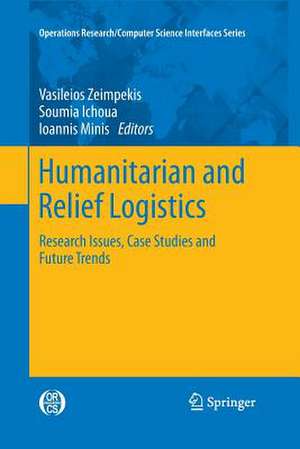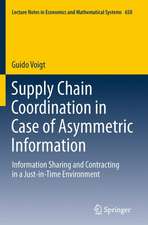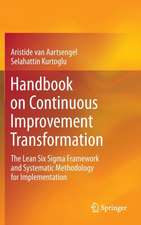Humanitarian and Relief Logistics: Research Issues, Case Studies and Future Trends: Operations Research/Computer Science Interfaces Series, cartea 54
Editat de Vasileios Zeimpekis, Soumia Ichoua, Ioannis Minisen Limba Engleză Paperback – 19 mai 2015
Significant issues in planning and execution of humanitarian relief logistics discussed in this volume include the following:
• Approaches that tackle realistic relief distribution networks. In addition to large-scale computing issues, heuristics may handle the complexity and particularities of humanitarian supply chains
• Methods that integrate real-time information while effectively coping with time pressure and uncertainty, both of which are inherent to a disaster scene
• Judicious recourse strategies that allow a quick and effective restoration of pre-planned solutions whenever an unpredictable event occurs
• Coordination of multiple parties that are often involved in managing a disaster, including NGOs, local, state and federal agencies.
This volume provides robust evidence that research in humanitarian logistics may lead to substantial improvements in effectiveness and efficiency of disaster relief operations. This is quite encouraging, since the unique characteristics of disaster scenes provide significant opportunities for researchers to investigate novel approaches contributing to logistics research while offering a significant service to society.
| Toate formatele și edițiile | Preț | Express |
|---|---|---|
| Paperback (1) | 637.46 lei 43-57 zile | |
| Springer – 19 mai 2015 | 637.46 lei 43-57 zile | |
| Hardback (1) | 642.36 lei 43-57 zile | |
| Springer – 24 apr 2013 | 642.36 lei 43-57 zile |
Din seria Operations Research/Computer Science Interfaces Series
- 24%
 Preț: 919.56 lei
Preț: 919.56 lei - 18%
 Preț: 944.19 lei
Preț: 944.19 lei - 18%
 Preț: 1227.21 lei
Preț: 1227.21 lei - 18%
 Preț: 947.67 lei
Preț: 947.67 lei - 18%
 Preț: 1224.54 lei
Preț: 1224.54 lei - 20%
 Preț: 1741.68 lei
Preț: 1741.68 lei - 18%
 Preț: 944.82 lei
Preț: 944.82 lei - 20%
 Preț: 1289.93 lei
Preț: 1289.93 lei - 18%
 Preț: 961.23 lei
Preț: 961.23 lei - 18%
 Preț: 951.59 lei
Preț: 951.59 lei - 20%
 Preț: 1047.88 lei
Preț: 1047.88 lei - 20%
 Preț: 642.65 lei
Preț: 642.65 lei - 18%
 Preț: 944.82 lei
Preț: 944.82 lei - 20%
 Preț: 996.07 lei
Preț: 996.07 lei - 20%
 Preț: 989.13 lei
Preț: 989.13 lei -
 Preț: 379.09 lei
Preț: 379.09 lei - 18%
 Preț: 954.62 lei
Preț: 954.62 lei - 18%
 Preț: 945.30 lei
Preț: 945.30 lei - 24%
 Preț: 908.30 lei
Preț: 908.30 lei - 18%
 Preț: 957.32 lei
Preț: 957.32 lei - 20%
 Preț: 996.88 lei
Preț: 996.88 lei - 15%
 Preț: 646.75 lei
Preț: 646.75 lei - 20%
 Preț: 1283.49 lei
Preț: 1283.49 lei - 18%
 Preț: 949.55 lei
Preț: 949.55 lei - 15%
 Preț: 658.88 lei
Preț: 658.88 lei - 18%
 Preț: 895.58 lei
Preț: 895.58 lei
Preț: 637.46 lei
Preț vechi: 749.95 lei
-15% Nou
Puncte Express: 956
Preț estimativ în valută:
121.98€ • 127.68$ • 101.52£
121.98€ • 127.68$ • 101.52£
Carte tipărită la comandă
Livrare economică 31 martie-14 aprilie
Preluare comenzi: 021 569.72.76
Specificații
ISBN-13: 9781493900855
ISBN-10: 1493900854
Pagini: 236
Ilustrații: XIV, 220 p.
Dimensiuni: 155 x 235 x 13 mm
Greutate: 0.34 kg
Ediția:2013
Editura: Springer
Colecția Springer
Seria Operations Research/Computer Science Interfaces Series
Locul publicării:New York, NY, United States
ISBN-10: 1493900854
Pagini: 236
Ilustrații: XIV, 220 p.
Dimensiuni: 155 x 235 x 13 mm
Greutate: 0.34 kg
Ediția:2013
Editura: Springer
Colecția Springer
Seria Operations Research/Computer Science Interfaces Series
Locul publicării:New York, NY, United States
Cuprins
A Decision Support System for Humanitarian Network Design and Distribution Operations.- Analytical Models for Estimating Waiting Times at a Disaster Relief Center.- Multiple Location and Routing Models in Humanitarian Logistics.- Preparedness Measures for Emergency and Disaster Response.- Military Logistics Planning in Humanitarian Relief Operations.- A Procurement Auctions-Based Framework for Coordinating Platforms in Humanitarian Logistics.- A Fuzzy Multicriteria Methodology to Manage Priorities and Resource Assignment in Critical Situations.- Logistics for Decision Support: An Application in Cases of Natural Disasters.- A Multi-agent Based Framework for Vehicle Routing in Relief Delivery Systems.- Modeling Facility Locations for Relief Logistics in Indonesia.- Humanitarian Logistics in the Great Tohoku Disasters 2011.
Textul de pe ultima copertă
This edited volume highlights recent research advances in humanitarian relief logistics. The contributed chapters span the spectrum of key issues and activities from preparedness to mitigation operations (response), planning and execution. The volume also presents state-of-the-art methods and systems through current case studies.
Significant issues in planning and execution of humanitarian relief logistics discussed in this volume include the following:
• Approaches that tackle realistic relief distribution networks. In addition to large-scale computing issues, heuristics may handle the complexity and particularities of humanitarian supply chains
• Methods that integrate real-time information while effectively coping with time pressure and uncertainty, both of which are inherent to a disaster scene
• Judicious recourse strategies that allow a quick and effective restoration of pre-planned solutions whenever an unpredictable event occurs
• Coordination of multiple parties that are often involved in managing a disaster, including NGOs, local, state and federal agencies.
This volume provides robust evidence that research in humanitarian logistics may lead to substantial improvements in effectiveness and efficiency of disaster relief operations. This is quite encouraging, since the unique characteristics of disaster scenes provide significant opportunities for researchers to investigate novel approaches contributing to logistics research while offering a significant service to society.
Significant issues in planning and execution of humanitarian relief logistics discussed in this volume include the following:
• Approaches that tackle realistic relief distribution networks. In addition to large-scale computing issues, heuristics may handle the complexity and particularities of humanitarian supply chains
• Methods that integrate real-time information while effectively coping with time pressure and uncertainty, both of which are inherent to a disaster scene
• Judicious recourse strategies that allow a quick and effective restoration of pre-planned solutions whenever an unpredictable event occurs
• Coordination of multiple parties that are often involved in managing a disaster, including NGOs, local, state and federal agencies.
This volume provides robust evidence that research in humanitarian logistics may lead to substantial improvements in effectiveness and efficiency of disaster relief operations. This is quite encouraging, since the unique characteristics of disaster scenes provide significant opportunities for researchers to investigate novel approaches contributing to logistics research while offering a significant service to society.
Caracteristici
Presents the state of the art in a fast-growing segment of Operations Research Covers logistics processes, preparedness, post-disaster response and supporting technologies in information systems Provides case studies and illustration of applications Includes supplementary material: sn.pub/extras











